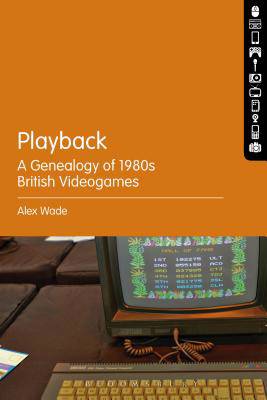
Bedankt voor het vertrouwen het afgelopen jaar! Om jou te bedanken bieden we GRATIS verzending (in België) aan op alles gedurende de hele maand januari.
- Afhalen na 1 uur in een winkel met voorraad
- In januari gratis thuislevering in België
- Ruim aanbod met 7 miljoen producten
Bedankt voor het vertrouwen het afgelopen jaar! Om jou te bedanken bieden we GRATIS verzending (in België) aan op alles gedurende de hele maand januari.
- Afhalen na 1 uur in een winkel met voorraad
- In januari gratis thuislevering in België
- Ruim aanbod met 7 miljoen producten
Zoeken
€ 271,45
+ 542 punten
Uitvoering
Omschrijving
Through interviews with developers, gamers, and journalists examining the phenomena of bedroom coding, arcade gaming, and format wars, mapped onto enquiry into the seminal genres of the time including driving, shooting, and maze chase, Playback: A Genealogy of 1980s British Videogames examines how 1980s Britain has become the culture of work in the 21st century and considers its meaning to contemporary society. This crucial and timely work fills a lacuna for students and researchers of sociology, media, and games studies and will be of interest to employees of the videogames and media industries.
Research into videogames have never been greater, but exploration of their historic drivers is as elided as the technology is influential, giving rise to a range of questions. What were the social and economic conditions that gave rise to a billion dollar industry? What were the motivations of the early 'bedroom coders'? What are the legacies of the seminal videogames of the 1980s and how do they inform the current social, political and cultural landscape? With a focus on the characteristics of the UK videogame industry in the 1980s, Wade explores these questions from perspectives of consumption, production and leisure, outlining the construction of a habitus unique to this time.
Research into videogames have never been greater, but exploration of their historic drivers is as elided as the technology is influential, giving rise to a range of questions. What were the social and economic conditions that gave rise to a billion dollar industry? What were the motivations of the early 'bedroom coders'? What are the legacies of the seminal videogames of the 1980s and how do they inform the current social, political and cultural landscape? With a focus on the characteristics of the UK videogame industry in the 1980s, Wade explores these questions from perspectives of consumption, production and leisure, outlining the construction of a habitus unique to this time.
Specificaties
Betrokkenen
- Auteur(s):
- Uitgeverij:
Inhoud
- Aantal bladzijden:
- 192
- Taal:
- Engels
Eigenschappen
- Productcode (EAN):
- 9781628924893
- Verschijningsdatum:
- 20/10/2016
- Uitvoering:
- Hardcover
- Formaat:
- Genaaid
- Afmetingen:
- 152 mm x 236 mm
- Gewicht:
- 430 g

Alleen bij Standaard Boekhandel
+ 542 punten op je klantenkaart van Standaard Boekhandel
Beoordelingen
We publiceren alleen reviews die voldoen aan de voorwaarden voor reviews. Bekijk onze voorwaarden voor reviews.









